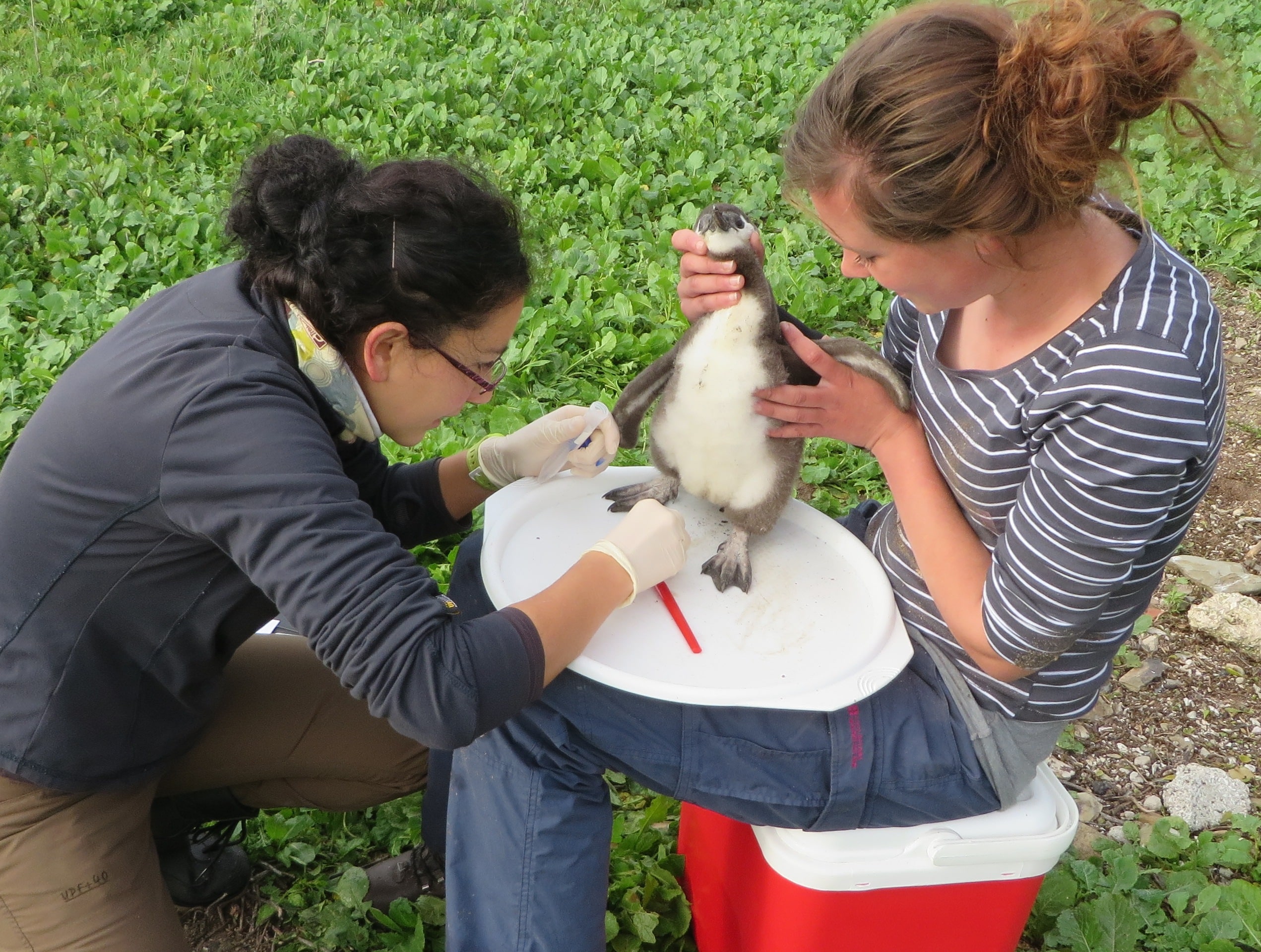Dr Marcela Espinaze from Stellenbosch University (SU) knows more than the average person about the ticks and fleas that are naturally part of an African penguin's life. It's because penguin parasites have been part and parcel of the 36-year old Chilean veterinarian's life for the past four years.
She researched the topic during her years as a PhD student in Conservation Ecology. Dr Espinaze received her doctorate from Stellenbosch University in April 2019.
Her doctoral research took her to five penguin colonies along the south-western Cape coast. She visited two land-based colonies at Simon's Town in the Cape and Stony Point near Betty's Bay in the Overberg and spent up to five days at a time on Dassen, Robben and Dyer Islands collecting samples.
Hers is the first thorough survey of the occurrence of external parasites (such as ticks and fleas found on the body of the penguins) and internal parasites (such as parasitic worms) on African penguins at several breeding places along or near the South African coastline. The only other such study on wild penguins was done in the 1980s on a single colony in Saldanha Bay.
Dr Espinaze says that the assistance and support that she received from conservation bodies such as CapeNature and SANParks, as well as the South African Foundation for the Conservation of Seabirds (SANCCOB), was invaluable.
“For each of my visits to a colony, SANCCOB, CapeNature and SANParks kindly provided a trained staff member to handle the birds, while I removed parasites," she explains. “The assistant's main task during the six or so minutes that I needed to sample was to safely handle the penguin and to prevent any injuries to humans."
In the process, she picked fleas and ticks off 210 adult penguins and 583 chicks, and also investigated the parasite contents of 628 nests – no small task!
“I found ticks and fleas on most of the birds and their nests," recalls Dr Espinaze, who recently published some of her findings in the scientific journal Parasitology.
The types of fleas and ticks that were recorded did not surprise Dr Espinaze. These were always in line with the parasites that are normally associated with penguins. Overall, chicks were found to be more infested than older adults were. 
“This might have to do with the fact that they have a weaker immune system than adults," she explains.
Penguins found on the mainland tended to have more ticks and fleas per animal compared to islands.
“Soft ticks and fleas are nest parasites and this pattern is related to the larger number of nests that are currently found at the mainland colonies," explains Dr Espinaze.
She says that the seasons also play a role in whether parasites thrive. Ectoparasites such as fleas and ticks prefer warm and dry conditions, which would explain their increase in the spring months.
“Chicks in particular are more vulnerable to parasites during warmer months, because they are so nest bound and not able to remove parasites themselves through preening," she elaborates.
According to Dr Espinaze, her findings do not raise any particular red flags in terms of the conservation of the endangered African penguin. As a trained veterinarian, she knows that parasites are naturally part of wildlife. In low to moderate numbers, they form part of the natural environment and ecology surrounding a specific species.
“If birds are healthy enough and environmental conditions are normal, then the birds are quite able to keep the number of parasites found on them in check through their usual preening," she says. “When nature is out of sync, as is being experienced currently because of dwindling fish sources, pollution and also climate change, the birds could however become more stressed and less likely to resist parasites."
In the coming year, Dr Espinaze will be taking some of her findings further to investigate the pros and cons of different types of penguin nests. In particular she will study whether different types of artificial nests influence the seabirds' health.
Penguins prefer making nests in guano. Because so much of this has over the years been removed from colonies to use as fertilizer, conservationists have begun providing different types of artificial nests for them to breed in and are investigating the success thereof.
“Each type of nest creates a different type of microclimate, and influences the temperature, ventilation and moisture experienced by the resident birds occupying the nests. However, this microclimate is also important for the development of nest parasites and drier and warmer nests tend to have more parasites, for instance", explains Dr Espinaze, who continues her research as a postdoctoral fellow in the SU Department of Mathematical Sciences.
Background about the African penguin
- The African penguin (Spheniscus demersus) is an endemic species and one of the most charismatic seabirds in Southern Africa.
- The total population was estimated at millions of individuals at the beginning of the 1900s but has since declined to such a degree that the penguin is classified as an endangered species.
- The global African penguin population is currently estimated to be less than 25,000 breeding pairs. They are found on 24 islands and four mainland colonies distributed from the central coast of Namibia to the Eastern Cape of South Africa.
More information:
- For a blog post on Dr Espinaze's work visit the website of Parasitology & Parasitology Open.
- Espinaze, M.P.A. et al (2019). Parasite diversity associated with African penguins (Spheniscus demersus) and the effect of host and environmental factors, Parasitology
Main photo: An African penguin with penguin ticks clearly showing on its face. Photo Marcela Espinaze
Photo 1: With the help of assistants, Dr Marcela Espinaze (left) was able to within minutes pick fleas and ticks off a selection of African penguins. Photo: Marcela Espinaze

